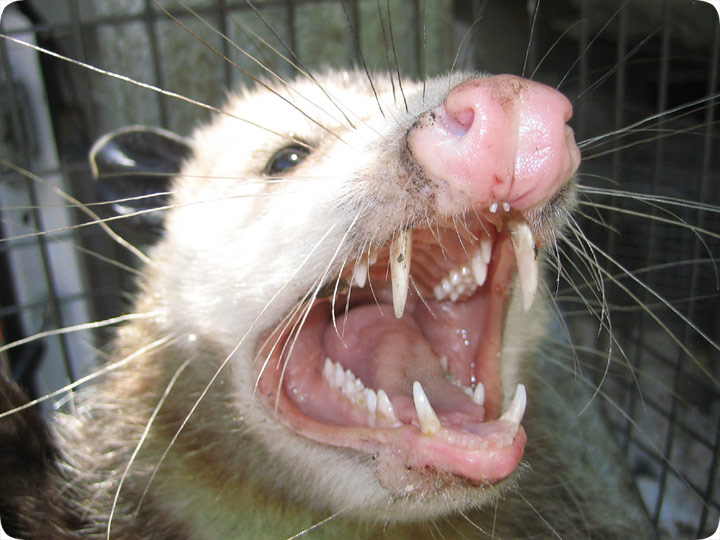-
info@aaanimalcontrol.com
Call us for help in your town
Humane Wildlife Education
Opossum Teeth - Threat Display

09.04.2007 - Opossums have the most teeth of any mammal* - 50 pointy teeth. When threatened, this slow critter often gapes its mouth open, exposing that mouth full of sharp teeth. It's just a threat display, however, and opossums very rarely bite. It's not that they
lack aggressiveness, it's just that they're too stupid to even manage a bite - seriously! They just stand there with their mouths open. I've shoved thick leather gloves and sticks into this wide open mouth, and the animal does nothing. It doesn't bite. I guess it's just
hoping that any aggressor will just back off at the sight of that intimidating mouth. After all, when a cottonmouth snake opens its mouth and shows its fangs, it will strike should you get too close.
I caught this opossum on a customer's roof. It was foraging there and scratching each night, perhaps looking for a way inside to the attic. I caught it on the second
night my trap was in place, and I removed it right away. I noticed that it really liked to show its mouth, so I figured why not, and I took this photo. I realize,
looking at it, that this animal also has quite an impressive display of whiskers.
*I have since learned, thanks to you, gentle readers, that some Orca whales can have more than 50 teeth, and that the Giant Armadillo (Priodontes maximus) has 80 - 100 teeth. Who knew?
The opossum, (Didelphis virginiana) is a nocturnal animal that lives in North America. It is a marsupial, which means that the females give birth to tiny young, who grow in a pouch. These young eventually cling to the mother's back and drop off when they are large enough.
Opossums are unique for many reasons. They have opposable thumbs, prehensile tails, 50 teeth, and several other unusual features. They are omnivores who eat almost anything, they have excellent immune systems, and they rarely live more than 2-3 years in the wild. They are most
commonly considered a nuisance species when they live in an attic or other structure, such as under a shed, or steal pet food or threaten animals.
Do it yourself: Visit my How To Get Rid of Opossums page for tips and advice.
Get professional help: Visit my Nationwide Pro Directory of wildlife removal experts.
For more wildlife stories, click my Wildlife Blog
or click my below banner to hire a local trapper.
Opossums are nocturnal animals that live in North America. They are a marsupial, meaning they can birth their young and nurture them in a pouch similar to kangaroos. Opossums are unique for many reasons yet also very misunderstood for very little reasons. They have opposable thumbs which allow them to have a precision grip and they are small in size, about the size of a small house cat. They are furred excluding their tails and are also known for their distinct pink noses. Opossums have a lifespan of about 2-3 years in the wild despite having excellent immune systems. They are omnivores and eat almost anything. You can often spot them near garbage receptors digging through the trash for food and scraps. Opossums are one of the most common nuisance wildlife animals and are often spotted living in attics and basements. They are a misunderstood species and often feared.
Do Opossums Bite?
Opossums have more teeth than any other mammal. They roughly have about 50 sharp pointy teeth they tend to expose as a defense mechanism or as a means to ward off threats from people and other animals.
When threatened, opossums will open their mouths as wide as possible to show off all their teeth while growling and hissing to further intimidate any potential threats. This is a defense mechanism for them and is a means to fend off any imminent threats. In reality, opossums are actually a rather complacent group of animals. They are far less likely to bite than to display the above-mentioned characteristics. Make no mistake that opossums can bite and have the capability to cause harm, they just rarely bite and actually try to avoid any confrontation at all costs. A growling opossum showing its teeth is just is a sign of fear and a threat display. They're just hoping that an aggressor will simply back off at the sight of their intimidating grill.
Are Opossums Dangerous?
While they generally try to avoid confrontation, opossums are capable of attacking and causing considerable harm to an aggressor. They will only attack when they feel threatened or cornered. For this reason, it is important to never engage an opossum if unnecessary. They can cause harm and are considered dangerous when being defensive. Furthermore, opossums are mainly considered dangerous due to the fact that they are can be carriers of some harmful diseases affecting pets and humans alike and they have the ability to easily spread these diseases. Opossums are known carriers of diseases like leptospirosis, tuberculosis, fever, tularemia, toxoplasmosis, coccidiosis, trichomoniasis, Chagas disease, and sometimes rabies, although very rarely so. Not only do opossums carry and transmit disease, but they also carry fleas and parasites that can also cause a slew of other potential diseases in addition to those mentioned above. Because opossums release a large amount of excrement, their droppings in a confined space like an attic, shed, or basement can contaminate the area and cause health issues such as leptospirosis and Salmonella, both of which can be fatal.




















